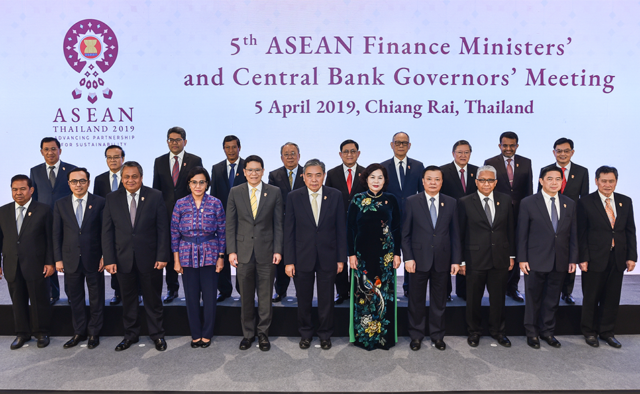The finance ministers of ASEAN have reiterated the region’s commitment to pursue an integrated bloc and strengthen financial stability amidst heightened uncertainties arising from trade tensions and policy adjustments of advanced economies.
They made the statement at the 5th ASEAN Finance Ministers’ and Central Bank Governors’ Meeting (AFMGM) in Chiang Rai, Thailand on April 5, where they also signed the 8th Protocol to Implement Financial Services Liberalization under the ASEAN Framework Agreement on Services (AFAS) to advance linkages among ASEAN member states (AMS) by further opening market access in the financial services sector.
They said negotiations for the 9th Protocol have started and encouraged the protocol’s early finalization.
The AFMGM also discussed key initiatives to further integrate the region’s payment systems in the digital economy, enhance connectivity and trade through customs cooperation, strengthen disaster resilience and promote sustainable financing in the capital markets and banking integration.
For the banking sector, they said two new bilateral arrangements under the ASEAN Banking Integration Framework (ABIF) have been concluded and will come into effect after the signing of the 8th Protocol.
“We encourage banks to take advantage of the ABIF arrangements as Qualified ASEAN Banks (QABs) could benefit from greater market access and operational flexibilities.”
Meanwhile, the AFMGM also noted ongoing efforts to promote the use of local currencies to enhance trade and direct investment flows in the region. It welcomed the signing of Letters of Intent between the Bangko Sentral ng Pilipinas (BSP) and Bank Indonesia, the BSP and Bank Negara Malaysia, and the BSP and the Bank of Thailand to establish a local currency settlement framework.
“We look forward to the completion of the Guiding Principles on Local Currency Settlement Framework, to guide AMS in establishing bilateral local currency settlement arrangements, in the ASEAN region by the end of the year,” said the AFMGM.
Customs and ASW developments
On customs cooperation, the ministers applauded ongoing development in the live operation of the ASEAN Single Window (ASW), the completion by all AMS of the ratification of the Protocol 7 (Customs Transit System) of the ASEAN Framework Agreement on the Facilitation of Goods in Transit (AFAFGIT), and the implementation of the ASEAN Harmonized Tariff Nomenclature 2017.
They encouraged the remaining AMS to join the live operation for the exchange of the ATIGA e-form D via the ASW by the end of this year, and complete the ratification of the Protocol 2 (Designation of Frontier Posts) of AFAFGIT to support the operationalization of the live run of the ASEAN Customs Transit System in 2019.
They likewise welcomed the efforts of the ASEAN Forum on Taxation (AFT) to complete the bilateral networks of Avoidance of Double Taxation Agreements among AMS and to improve the implementation of exchange of information for tax purposes.
“We also welcome the AFT’s initiative on developing a Standardised Certificate of Residence (CoR) in ASEAN, which would efficiently facilitate tax treaty benefit claims among members,” they declared.
Regarding the ASEAN Insurance Forum (AIFo), the ministers and governors endorsed the Handbook on ASEAN Insurers offering Cross-Border Marine, Aviation and Goods in Transit (MAT) Insurance, which will provide greater clarity to industry on MAT definition, regulatory framework and consumer protection mechanisms among AMS.
“We also commend the AIFo for completing the Guiding Principles for the implementation of insurance liberalisation, and for making a good progress on developing the Roadmap for the ASEAN Insurance Integration Framework (AIIF).”
ASEAN Capital Markets Forum Pass
They also welcomed the launch of the ASEAN Capital Markets Forum (ACMF) Pass, which came into effect on January 1, 2019, to facilitate cross-border movement of investment advisers.
They also showed appreciation in the efforts of the Working Committee on Payment and Settlement Systems (WC-PSS) to create an enabling environment that promotes regional linkages and payment systems that are safe and efficient.
“We welcome the development of the ASEAN Payments Policy Framework to guide cross-border real-time retail payments across the AMS to achieve a more competitive economic bloc.”
“We welcome the initiative to explore the feasibility of interoperable QR codes to promote the use of innovative retail payment instruments across the AMS, ultimately to lower cost of services and encourage the use of local currencies to settle cross-border transactions.”
This, they added, is done with recognition of recent collaborations, which include Thailand, Cambodia, Laos, and Singapore. These initiatives will collectively enable greater cross-border payments to support intra-ASEAN trade and tourism.
“Furthermore, we welcome the progress on the Thailand and Singapore payment system linkage and look forward to its live-operation by the first half of 2020,” said AFMGM.
Accelerating ASEAN infrastructure funding
The ministers also pushed for accelerated infrastructure development and financing in ASEAN through mobilizing private capital. Towards this end, it noted the ASEAN Infrastructure Fund’s two innovative windows: Inclusive Finance Facility, which would offer limited concessional loans to Cambodia, Myanmar and Laos, and ASEAN Catalytic Green Finance Facility, which can help catalyze private sector financing into regional infrastructure projects.
They welcomed the close collaboration and the joint initiative between the ASEAN Capital Markets Forum or ACMF and the Working Committee on Capital Market Development (WC-CMD) on infrastructure financing and sustainable financing,
ACMF and WC-CMD will collaborate closely to develop standardized contractual terms for project documents and project finance documents, and infrastructure investment benchmarks and indices; and explore the development of a register of investors for both green and infrastructure projects and a catalogue on the pipeline of infrastructure projects.
The finance executives also endorsed the ACMF initiative to create the Roadmap for ASEAN Sustainable Capital Markets and support its future implementation.
“The Roadmap will provide a common vision and comprehensive direction to strengthen ASEAN’s commitment on promoting an ecosystem for sustainable capital market development.”
“We also appreciate the ACMF’s efforts to promote sustainable capital markets through the initiative on ASEAN standards on sustainable financing with the adoption of the ASEAN Green, Social and Sustainability Bond Standards.”
“We welcome the efforts of the WC-CMD in developing a report on sustainable financing in ASEAN, which specifies an action plan to promote green, social and sustainability bond issuances using the ASEAN Green, Social, and Sustainability Bond Standards,” it continued.
The report is set for completion and presentation at the next AFMGM for endorsement.
The ministers welcomed the achievements of the Working Committee on Financial Inclusion (WC-FINC) towards the desired outcome of more financial inclusion in the region and of having the presence of enabling regulations and infrastructure.
They lauded the publication of the Guidance Notes on Digital Financial Services and the Guidance Notes on Financial Education and Consumer Protection early this year, and urged the WC-FINC to continue working on knowledge sharing and capacity building on E-payments and Fintech, among others, and on developing the Guidance Notes on Monitoring Financial Inclusion Framework and the Framework for Microinsurance Product.
Disaster risk financing
On disaster risk financing, the ministers endorsed the Phase 2 Plan of Action of the ASEAN Disaster Risk Financing and Insurance that will support the provision of disaster risk financing and insurance solutions in the region.
They also acknowledged that five AMS and Japan, together with the World Bank as lead advisor, have signed a memorandum of understanding to collaborate in setting up and implementing the Southeast Asia Disaster Risk Insurance Facility.
“The two initiatives complement each other and play an integral part in closing ASEAN’s protection gap and reinforcing ASEAN’s disaster resilience.”
In terms of cyber resilience, the AFMGM said that “we recognise the importance of closer ties and regional cooperation among AMS on cybersecurity information sharing and capacity building initiatives through Cybersecurity Resilience and Information Sharing Platform (CRISP).”
“Given the global and cross-border nature of cyber risks, we encourage ASEAN central banks to actively participate in CRISP as well as global platforms, to enhance regional and global cyber risk information sharing. We also look forward to cyber capacity building initiatives for financial regulators.”
Moreover, “we recognise the growth in digital asset related activities and the potential risks. Therefore, we support the work under the ACMF to develop the ASEAN Framework for Cooperation on Digital Asset Oversight to exchange views and share information on regulatory development and to provide public information for investors protection.”









